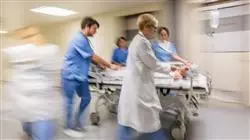University certificate
The world's largest faculty of medicine”
Introduction to the Program
Become an expert in Adverse Events at Patient Discharge and Incident Reporting Systems in only 6 months and with total freedom of schedules"

Clinical risk assessment is critical to providing safe and effective medical care to patients. Early identification of risks and implementation of preventive measures are crucial to minimize the risk of health care related adverse events. By fostering a culture of patient safety and providing adequate training and resources, health care professionals can ensure that clinical risk assessment is conducted effectively and patient safety is promoted.
For this reason, TECH has designed a Postgraduate diploma in Clinical Risk Assessment in Health Care to provide students with the necessary skills and skills to be able to perform their work as physicians with the highest possible efficiency and quality. Therefore, throughout this program, aspects such as Errors in Health Care and Adverse Events, Multidisciplinary Management of the Hospitalized Patient or the Detection of Errors with New Technologies will be addressed.
All this, thanks to a convenient 100% online mode that allows students to organize their schedules and studies, being able to combine them with their other daily work and interests. Likewise, the syllabus has the most dynamic and complete didactic materials and practical activities available in the market.
Expand your knowledge on Clinical Risk Management and Health Technology Assessment, in a 100% online modality and in the comfort of your home"
This Postgraduate diploma in Clinical Risk Assessment in Health Care contains the most complete and up-to-date scientific program on the market. The most important features include:
- The development of case studies presented by healthcare experts in Clinical Risk Assessment in Healthcare
- The graphic, schematic, and practical contents with which they are created, provide scientific and practical information on the disciplines that are essential for professional practice
- The practical exercises where the self-evaluation process can be carried out to improve learning
- Its special emphasis on innovative methodologies
- Theoretical lessons, questions to the expert, debate forums on controversial topics, and individual reflection assignments
- Content that is accessible from any fixed or portable device with an Internet connection
Maximize your knowledge of Health Care-Related Infection Control (HCAI), in a few months and from your Tablet, mobile or computer"
The program includes in its teaching staff professionals of the field who pour into this training the experience of their work, in addition to recognized specialists from reference societies and prestigious universities.
Its multimedia content, developed with the latest educational technology, will allow the professional a situated and contextual learning, that is, a simulated environment that will provide an immersive training programmed to train in real situations.
The design of this program focuses on Problem-Based Learning, in which the professional will have to try to solve the different professional practice situations that will arise throughout the academic course. For this purpose, the student will be assisted by an innovative interactive video system created by renowned experts.
This program will enhance your skills and skills in one of the most promising areas in the field of Medicine"

Get to know in depth aspects such as the HCAI Classification or AI for Patient Safety"
Why study at TECH?
TECH is the world’s largest online university. With an impressive catalog of more than 14,000 university programs available in 11 languages, it is positioned as a leader in employability, with a 99% job placement rate. In addition, it relies on an enormous faculty of more than 6,000 professors of the highest international renown.

Study at the world's largest online university and guarantee your professional success. The future starts at TECH”
The world’s best online university according to FORBES
The prestigious Forbes magazine, specialized in business and finance, has highlighted TECH as “the world's best online university” This is what they have recently stated in an article in their digital edition in which they echo the success story of this institution, “thanks to the academic offer it provides, the selection of its teaching staff, and an innovative learning method aimed at educating the professionals of the future”
A revolutionary study method, a cutting-edge faculty and a practical focus: the key to TECH's success.
The most complete study plans on the university scene
TECH offers the most complete study plans on the university scene, with syllabuses that cover fundamental concepts and, at the same time, the main scientific advances in their specific scientific areas. In addition, these programs are continuously being updated to guarantee students the academic vanguard and the most in-demand professional skills. In this way, the university's qualifications provide its graduates with a significant advantage to propel their careers to success.
TECH offers the most comprehensive and intensive study plans on the current university scene.
A world-class teaching staff
TECH's teaching staff is made up of more than 6,000 professors with the highest international recognition. Professors, researchers and top executives of multinational companies, including Isaiah Covington, performance coach of the Boston Celtics; Magda Romanska, principal investigator at Harvard MetaLAB; Ignacio Wistumba, chairman of the department of translational molecular pathology at MD Anderson Cancer Center; and D.W. Pine, creative director of TIME magazine, among others.
Internationally renowned experts, specialized in different branches of Health, Technology, Communication and Business, form part of the TECH faculty.
A unique learning method
TECH is the first university to use Relearning in all its programs. It is the best online learning methodology, accredited with international teaching quality certifications, provided by prestigious educational agencies. In addition, this disruptive educational model is complemented with the “Case Method”, thereby setting up a unique online teaching strategy. Innovative teaching resources are also implemented, including detailed videos, infographics and interactive summaries.
TECH combines Relearning and the Case Method in all its university programs to guarantee excellent theoretical and practical learning, studying whenever and wherever you want.
The world's largest online university
TECH is the world’s largest online university. We are the largest educational institution, with the best and widest online educational catalog, one hundred percent online and covering the vast majority of areas of knowledge. We offer a large selection of our own degrees and accredited online undergraduate and postgraduate degrees. In total, more than 14,000 university degrees, in eleven different languages, make us the largest educational largest in the world.
TECH has the world's most extensive catalog of academic and official programs, available in more than 11 languages.
Google Premier Partner
The American technology giant has awarded TECH the Google Google Premier Partner badge. This award, which is only available to 3% of the world's companies, highlights the efficient, flexible and tailored experience that this university provides to students. The recognition as a Google Premier Partner not only accredits the maximum rigor, performance and investment in TECH's digital infrastructures, but also places this university as one of the world's leading technology companies.
Google has positioned TECH in the top 3% of the world's most important technology companies by awarding it its Google Premier Partner badge.
The official online university of the NBA
TECH is the official online university of the NBA. Thanks to our agreement with the biggest league in basketball, we offer our students exclusive university programs, as well as a wide variety of educational resources focused on the business of the league and other areas of the sports industry. Each program is made up of a uniquely designed syllabus and features exceptional guest hosts: professionals with a distinguished sports background who will offer their expertise on the most relevant topics.
TECH has been selected by the NBA, the world's top basketball league, as its official online university.
The top-rated university by its students
Students have positioned TECH as the world's top-rated university on the main review websites, with a highest rating of 4.9 out of 5, obtained from more than 1,000 reviews. These results consolidate TECH as the benchmark university institution at an international level, reflecting the excellence and positive impact of its educational model.” reflecting the excellence and positive impact of its educational model.”
TECH is the world’s top-rated university by its students.
Leaders in employability
TECH has managed to become the leading university in employability. 99% of its students obtain jobs in the academic field they have studied, within one year of completing any of the university's programs. A similar number achieve immediate career enhancement. All this thanks to a study methodology that bases its effectiveness on the acquisition of practical skills, which are absolutely necessary for professional development.
99% of TECH graduates find a job within a year of completing their studies.
Postgraduate Diploma in Clinical Risk Assessment in Health Care
Clinical risk assessment in healthcare is a systematic process that aims to identify potential risks in patient care in order to minimize them and improve patient safety. This process is carried out by identifying the factors and situations most likely to cause harm or injury to patients, as well as assessing the probability and impact of such risks. At TECH Global University we have this academic program designed with the objective of providing skills and knowledge necessary to identify, assess and manage clinical risk in healthcare practice.
The clinical risk assessment process can be applied in a variety of areas within healthcare, including clinical practices, surgical procedures, diagnostics, therapies and general patient care processes. Some of the most commonly used tools in clinical risk assessment include safety assessments, root cause analysis, inspections, and quality audits, among others. In this expert program you will address topics such as risk assessment in different healthcare settings: primary care, hospital care, palliative care, among others. It is an excellent choice for those who wish to acquire specialized skills an develop a successful career in this field.







